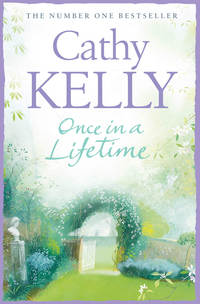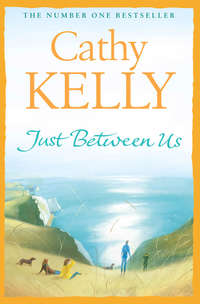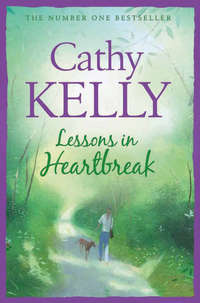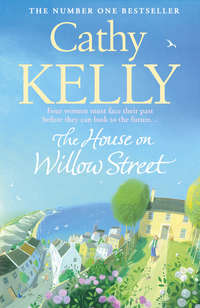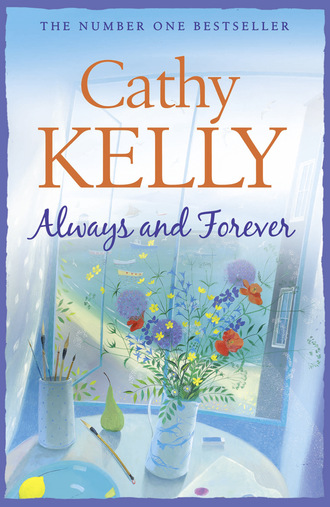
Полная версия
Always and Forever
Mel knew she should have come up with some better explanation as to why she wouldn’t be at the zoo but she just couldn’t. Her energy had drained away.
‘Sarah, I can’t go with you. Dawna is going and you love Dawna.’
For a brief second, mother and daughter’s eyes met, the same candid blue with glints of darkest violet near the irises giving them remarkable depth. In that moment, Mel thought her daughter looked old and knowing, as if she could see the exhaustion and guilt in her mother’s eyes, and knew that Mel would have done anything to be in two places at the one time if it would make Sarah happy. Then it was gone, replaced by the childish incomprehension that Mummy was once again choosing work over Sarah’s world. Mel wondered why Adrian told the children she was a super mum. She was a crap mum.
‘You were a long time,’ Adrian remarked when she finally arrived downstairs at ten past eight, carrying dirty clothes, wet towels and a half-eaten baby rusk that she’d found squashed into the landing carpet.
‘Sarah didn’t want to go to sleep,’ muttered Mel. She dumped the laundry in the basket, which managed to look horribly full again, and headed for the fridge and a glass of wine. There was none. Hadn’t that been last week’s plan? No wine was to be opened during the week because then she had a glass every evening and surely it was bad for her. Bad, schmad. Where was the corkscrew?
The booze was locked in a cupboard in the dining room. Mel took out a bottle of the expensive Chablis that Adrian loved. She handed him a glass, which he took without looking up from his books. A plate of half-finished beans on toast lay beside him. His exams were in May and he was studying hard.
‘Lovely wine,’ he muttered, head back in his coursework.
‘Mm,’ she said, taking a deep gulp. Better than the old screw-top bottles they used to drink before they both had good jobs. There had to be some compensations for work. A thought drifted into Mel’s mind: was that what her job was all about – making money? She went out to work and paid someone else to bring up her children so that she and Adrian could afford good wine?
Mel had eaten her beans on toast and was half reading the paper and half waiting for the washing machine to finish its cycle so she could put on another load, when Adrian said, ‘Oh, forgot to tell you but Caroline phoned when you were doing the baths to remind you that you’re all meeting up in Pedro’s Wine Bar at half-eight on Thursday night, and if you’re driving can you pick her up?’
‘Oh, damn,’ muttered Mel. ‘It’s the last thing I feel like this week. And she should know I don’t drive to work.’ Caroline was a very old friend who lived in Dublin’s suburbia, and the party was their delayed Christmas get-together with a group of other old friends – cancelled so many times that they’d finally decided to have it in January. Once, Caroline and Mel had shared an apartment and worked in the same company, going on wild nights out, comparing notes on unsuitable men and planning how they’d run the world when their time came. Now Caroline was a full-time mother of three and dedicated herself to the job.
She was, as Mel and everyone else recognised, fabulous at it. Being a mother was her true vocation, and not drinking triple vodkas in shady clubs, as Mel loved to tease her.
Mel knew that her friend’s three small sons had never eaten a single thing out of a jar when they were babies. If this had been anyone else but the tactful Caroline, Mel would have been made to feel hideously guilty. Her plans to mush up organic carrots had fallen by the wayside when she went back to work and discovered that huge organisation was involved in buying and mushing organic stuff, when it was easier to just buy cute baby jars with nice pictures on the outside. Anyway, the kids liked the jars more than they’d ever liked any of her painstakingly sieved mush.
It was all down to choice, Caroline said serenely. She liked being at home with her children making fairy cakes and having other rampaging toddlers round for tea, but that wasn’t for everyone.
‘You’re out there talking the talk and walking the walk, Mel,’ she said. ‘One of us has to be a captain of industry, and since it isn’t going to be me, I’d like it to be you. Just don’t forget us humble old pals when you’re getting the Nobel Prize for Services to the Business Sector or whatever.’
‘Stop it,’ begged Mel. ‘You’re making me cry.’
What she didn’t quite understand was why Caroline hadn’t gone back to work now that the boys were all in school. Not that she’d ever said that to Caroline, she thought as she tapped out her friend’s number.
‘Hi, Caroline, sorry I missed you. I was on bath duty.’
‘Mel, I know, I phoned at the wrong time. It’s just that I didn’t want to bother you at work. So, how are you?’
Caroline sounded relaxed and happy, and for some reason this vexed Mel more than she could say. Caroline had given up her high-powered job to sit at home and watch the Disney Channel – she should be bored and irritable, not happy.
‘We’re all great,’ Mel lied. ‘Just great.’ She paused, hoping that a sudden change of plan meant that the night out on Thursday had been cancelled. She daren’t cancel again, although she longed to. How could she have agreed to a night out mid-week, such a horribly busy week at that? She’d have to go straight to the restaurant from work, then get the late train home, and she’d miss seeing Sarah and Carrie.
‘About Thursday night…?’
‘Val’s coming, and Lorna’s dying to get out,’ Caroline said. ‘You’d think she never left the house when I know for a fact that they were away for New Year. It’ll be fabulous. I think I’m going to wear my new pink shirt – you know, the one I told you about. It’s gorgeous, but it’s a bit silky, so I probably should wear a camisole under it because if I wear a normal bra, you could see it through the shirt. I’ve tried it on twice already today and I’m still not sure. Although I tried on that cream printed one I told you about, and that might do. It’s not as dressy but…I do love the pink one, though.’
Briefly, Mel imagined what it must be like actually to have time to decide what to wear on a night out instead of having the usual, last-minute panic in the morning where she ran upstairs and hastily dragged something sparkly from the wardrobe to take into work so she could brighten up her office clothes later.
‘Would the pink be OK or will I be totally mutton dressed as lamb?’ Caroline was asking.
Did other people ever want to kill their friends with their bare hands or was it just her? Mel thought. Had she turned into a fearsome old harpy now that she had all the things she’d said she’d ever wanted, like children and a good job?
‘What do you think? Pink might be the navy blue of India or whatever, but baby-pink silk on a woman of thirty-nine, is it asking too much?’
‘Pink sounds great,’ Mel said evenly.
‘OK, I’ll wear it. I’m really looking forward to it, I can tell you. Sometimes you do need to get out of the house and realise there’s a whole world out there, don’t you?’
‘Absolutely,’ said Mel, ‘absolutely.’
‘Any wine left?’ asked Adrian when she hung up.
‘Yes, but we shouldn’t have too much mid-week. We can finish the bottle tomorrow,’ Mel said, and realised in a horrified moment that she was using the same placating voice she used for the children. Worse, Adrian didn’t appear to notice.
Pedro’s Wine Bar was the type of place where the people in Lorimar Health Insurance went on their lunch breaks when they wanted more than the usual half an hour for a snatched sandwich. It was a modern Italian establishment with shadowy candle-lit tables where plots were hatched, affairs were conducted, and people occasionally ordered too much wine because of their job/their home life/their credit card bill/all of the above.
Caroline, Lorna and Val loved it because it reminded them of their lives pre-children when they’d gone for long lunches in town and planned coups with their colleagues while handsome young waiters hovered in the background wielding bottles of Frascati and scenting large tips. All of which was exactly why Mel didn’t like it.
‘Ooh, cocktails,’ squealed Lorna, as soon as they got through the door on Thursday evening. Grasping the laminated cocktail menu, she read out the list excitedly. Halfway down it, she began to laugh.
‘Who wants a Slippery Nipple?’ she said with glee.
Caroline and Val joined in the laughter.
‘Wine for me,’ said Val ruefully. ‘Or I won’t get up in the morning.’
‘And me,’ said Caroline, mindful of doing the school run.
‘Oh, go on, let your hair down. Have a…’ Lorna scanned the list, ‘Vodkatini, Manhattan, no! a Pink Lady, to match your shirt. What about you, Mel? I’m sure you’re out at events all week with your job. What’s the fashionable drink now for us boring old mums?’
Mel found that she was still holding on to her handbag very tightly, the tendons in her hands standing out like vines. She was keyed up after the stress of the day with no numbingly familiar train journey to soothe it away. Gently, she put her bag on the seat beside her and tried to enter into the spirit of the night. She would not let Lorna get to her.
‘Corporate events are few and far between these days,’ she said evenly. ‘And I never drink at them, so I’m the wrong person to ask advice about the hip new drinks. I’ll have wine too, but only one glass. I’ve got an early meeting –’
‘You executive types don’t know how to let your hair down,’ interrupted Lorna. ‘Just one cocktail each and then we’ll be sensible, OK?’
After the cocktails arrived, the conversation moved on to schools. Lorna was heavily involved in the parent/teacher association in her children’s school and over their second cocktail, Mel was astonished to learn that Caroline had joined a national group who were lobbying for greater parental input in primary schools.
‘You’re so good to do that,’ said Val guiltily, stirring her White Cranberry Ice, a lethal concoction that slipped down too easily. ‘I should but…’ she looked at Mel as if they were in this together, ‘it’s so hard to find the time, isn’t it? I’m so busy with everything. I’m still going to Weight-Watchers, and I’ve only half a stone to go.’
Everyone raised their glass to her and told her she looked wonderful.
‘Thanks,’ beamed Val. ‘But I’ve got to fit in a long walk three times a week and what with all the extracurricular activities the kids are doing, like gymnastics – did I tell you Maureen’s taken it up? Twice a week it is – there isn’t the time for anything else.’ She flashed another gaze of complicity at Mel.
Mel didn’t return the look. She couldn’t. There was no comparison between her and Val. Val was a twenty-four-hour mother and if she didn’t manage to fit in the parents’ association because she was busily baking additive-free carob cookies and keeping herself fit, then it was hardly a crime.
What was more, Mel was a non-mother during the hours of nine to five – or, more accurately, between half-seven in the morning and seven in the evening – and if Carrie or Sarah one day decided they wanted to do gymnastics, then how the hell would it be managed?
‘How are Carrie and Sarah?’ asked Lorna, turning her attention to Mel. ‘Sarah must be going to school soon. It’s such a milestone, isn’t it?’ She sighed. ‘One minute they’re babies, the next they’re in school.’
Mel waited to see if Lorna would make the usual remark about how she was so glad she’d given up work when Alyssa was born because childhood went so quickly and you had to be there for it. She did it every single time they were out. Sometimes, to add insult to injury, she mentioned how hard it must be on Mel to have to miss all the important moments in her daughters’ lives.
‘I’m not getting at you, Mel, when I say this,’ Lorna said with all the inevitability of thunder following lightning, ‘but it must be so hard for anyone who has to go out to work. You do miss so much of their lives. I read something the other day in a magazine about a childcare worker who admitted that they lie to parents sometimes.’
‘Lie about what?’ asked Mel, ready to do battle.
‘Lie about when the child has taken their first steps or whatever,’ Lorna went on blithely. ‘Apparently, they say the child has nearly done it, nearly walked, for example, so that when they do it at home, the parents think they’re witnessing it for the first time. Sad.’ She turned a fake smile on Mel. ‘Honestly, women have to cope with so much, don’t they?’ she said. ‘But it’s worth it. Children make it all worthwhile.’
‘Absolutely,’ agreed Caroline.
‘You said it,’ added Val fervently.
Mel went through all the things she wanted to say to Lorna and thought she had better not.
The conversation whipped round to gossip about another friend of theirs who was about to get married for the second time and was having the wedding she’d always dreamed of on Australia’s Gold Coast. As the others talked about how they’d love to go but couldn’t, Mel felt herself sinking into the sort of self-berating misery that no amount of White Cranberry Ices could defeat.
Lorna’s needling got to her every time for one simple reason: because Mel was so terribly scared that Lorna was right. If only Lorna could be more sensitive…After all, not everyone could afford to stay at home with their kids.
Adrian was half asleep when Mel slipped under the duvet beside him. It was after twelve and she felt sick at the thought that she had to be up again in just over five hours.
‘Did you have a good time?’ he murmured, turning to put one arm around her.
Mel snuggled into his embrace. The heating was off and she felt cold. Adrian was always warm and it was a long-running joke between them that he wanted just a sheet and the lightest duvet imaginable on the bed in winter, while she wanted an electric blanket, about four heavy blankets and a flannelette, instant-turn-off nightie.
‘It was fine,’ she said, settling herself into the comfiest position against him. But it hadn’t been.
Lorna had been all set for going to a nightclub when Mel got up to leave, pleading exhaustion.
‘You used to be a wild woman!’ Lorna had said in the accusatory tone of the blind drunk as Mel pulled on her coat and checked that she had enough money for a taxi to the train station. ‘What’s happened to you? Are we such boring friends that you don’t have time for us any more, is that really it?’
After an entire night of feeling guilty for the fact that she no longer had enough time to meet up with the girls more than a couple of times a year, Mel’s patience snapped.
‘I have a job, Lorna, a job where I have to produce results all day, and then, when I go home, I get to do all the work that you do but in about a quarter of the time. So forgive me if I’m not ready to party on all night but if I have a hangover, I can’t go back to bed when the kids have gone to school. My job won’t wait like the shopping or the washing. I’m not my own boss, you see.’
She was being unfair but she didn’t care. Lorna had been unfair about Mel having to work: if she dished it, she should be able to take it.
‘And since you find my company so boring,’ Mel finished, ‘don’t bother to phone me next time you want a big night out where you get pissed and compare parent/teacher council stories. I don’t have time for that. I’m too busy missing all the milestones in my children’s lives.’
She’d left then, with Caroline, Val and Lorna staring open-mouthed after her. In the taxi to the train station, Mel had cursed herself for letting Lorna goad her. Why hadn’t she held her tongue? It wasn’t even that she’d been horrible to Lorna that mattered – Lorna was plastered and wouldn’t remember any of it. And it was about time Lorna got some of her own medicine. Hurting Caroline, however, was different. Caroline was a true friend and now she’d think that Mel was one of those bitchy career women who looked down on stay-at-home mothers, when she wasn’t. It was all such a mess.
‘How’s Caroline?’ asked Adrian sleepily.
‘She’s OK,’ Mel said. There was no point bothering him with any of this.
‘We missed you,’ Adrian said, his voice muffled against the silk of her hair.
‘Missed you too,’ she said truthfully. ‘Go to sleep, love. Sorry for waking you up.’
‘I couldn’t sleep properly until you were in,’ he said.
In the darkness, Mel smiled and curled her body closer into the curve of his. She was lucky to have a husband like Adrian. He told her he loved her and missed her. Not all men were able to be as honest. They made a good team and they’d get through the difficult times together, or so Adrian was always saying. It was just that the difficult times seemed to outweigh the good ones lately.
The next day, Mel didn’t phone Caroline until just before lunch, when she knew her friend would be at home after the morning school run and the inevitable grocery shopping.
For the first time in their friendship, Caroline’s tone was frosty. ‘You didn’t need to be so hard on Lorna,’ she said sharply.
At her desk, Mel rubbed her tired face. Lack of sleep made her forget all the things she’d planned to say.
‘Lorna made a difficult choice to stay at home with her children and give up her career for the moment; that doesn’t mean she’s a non-person,’ Caroline continued. ‘We’re fed up with people asking, “What do you do?” and then tuning out when you say you stay at home with your kids. It’s bad enough when men do it without another woman doing it too. I thought you understood why I gave up my job, Mel – that I couldn’t bear to leave my babies for someone else to bring up. If I’d known that you really looked down on me, then I wouldn’t have kept in touch with you. I’ve got plenty of new friends who do what I do; I don’t need to cling on to you for old times’ sake just because we once sat at desks opposite each other and bitched about our boss.’
‘Don’t be like that, Caroline,’ Mel begged. ‘I didn’t mean it like that, you know I didn’t. I don’t look down on you. In fact,’ she laughed without mirth, ‘I think the boot’s on the other foot.’ Why didn’t Caroline understand that working mothers like Mel felt that the stay-at-home mothers like Lorna looked down on them? ‘I wish I could stay at home and look after Carrie and Sarah too,’ she began, and stopped in shock. There, she’d said it. She’d told someone her deepest secret, the secret she’d only just recognised in herself. She did wish she could stay at home. She was tired of her life, tired of running on a treadmill like a caffeined-up hamster and never getting anywhere.
‘Of course, I know what you mean,’ said Caroline, sarcasm glittering in her voice. ‘You wish you could lounge around all day at home because that’s what you think it’s like, but it’s not. It’s not meandering round the shops and meeting other housewives for coffee and doing the odd bit of washing and ironing at home in between watching Oprah. It’s damn hard and very boring.’
‘I know, I realise that,’ stammered Mel. ‘You’ve got me wrong…’
‘You think I don’t remember what it was like to have an interesting job and have people look up to me? To earn my own money and use my talents to the full?’ Caroline went on shakily. ‘And now I’m just a stay-at-home mother, a housewife, a dependant, and nobody respects that. Graham jokes that I’m the CEO of the household but this is the only CEO job where nobody places the slightest value on what you do. I thought you understood all this, and that occasionally it was nice for me to touch the old world again with you and remember what it used to be like, but I can see I was wrong. You just look down on me.’
‘No, Caroline,’ begged Mel, ‘I don’t. It’s just that Lorna really gets at me…’
‘Mel, I don’t have time to talk to you right now.’ Caroline spoke crisply. ‘I have things to do. Oprah’s going to be on TV any minute and I’d hate to miss it. Goodbye.’ And she hung up.
‘Caroline, no…’ How had they got themselves in this mess? Just when Mel suddenly understood why Caroline had given up her job in favour of taking care of her three little boys? Because now, finally, after years of trying to keep all the balls in the air, that’s what Mel wanted too.
Hardly had Mel a chance to put the receiver back in the cradle, when the phone rang again.
‘Mel, I’m sorry, I know it’s lunchtime but I’ve got a journalist from the Echo on the line,’ said Sue, the department assistant, ‘a Peter Glennon and he’s phoning about a statistic on the website about heart disease and how they aren’t the right figures for Ireland.’
‘Put him through,’ said Mel pleasantly, as if she hadn’t just got off the phone from a horrible conversation with one of her oldest friends. Lunch, like thinking about her row with Caroline, could wait. Everything had to wait for work, didn’t it? Her life, her family, her friends. Work ruled.
CHAPTER TWO
The Willow Hotel had been a part of Carrickwell as long as anyone could remember. Other, grander establishments had come and gone, bringing variously nouvelle cuisine, Zen-like simplicity and chic modern style to the area, but only three hotels remained in the town: the Carrick Park, a motel on the main road to the city; the Townhouse, a small business establishment near the cathedral that did a roaring trade in office lunches, and the Willow, a big, rambling Georgian country house hotel that was crammed with shabby antiques, was hell to heat and had managed only to stay more or less solvent in the thirty years since Cleo’s parents had taken it over.
Harry and Sheila Malin had been newly married then and thought the Willow would be a great place to rear a family, what with its enormous overgrown back garden and the big house for children to tear around in, and they’d thrown themselves into running the place with great gusto, even though they hadn’t a smidgen of experience between the pair of them. Somehow they’d managed it, and thirty years and three children later, the Willow was still there: a landmark building on five valuable acres of land on the outskirts of the town.
It featured in guidebooks in the country house category, the sort of place where guests could feel they were visiting a friend’s large, old-fashioned, comfortably down-at-heel home rather than a hotel. There were sixteen bedrooms, each one different, two suites, and a tiny ballroom where small, intimate wedding receptions could be held.
The Willow Hotel was the same as it had always been. It was Carrickwell that had changed over the years. No longer a sleepy town, it had become a busy part of the commuter belt where property prices rocketed and where other hotel-owners were always trying to set up shop.
The most recent bit of competition had come from the large Victorian rectory on the Glenside Road, where all the bedrooms were done up like a Parisian brothel, complete with mirrors and an abundance of plum-coloured velvet and leopardskin. Cleo’s father had surreptitiously checked it out and was able to report back that the breakfasts were bad – continental instead of the good solid fry-up that most people wanted, high cholesterol notwithstanding – and that the owner seemed more keen on having the place photographed in style magazines than attending to the daily routine of a hotel.
The leopardskin palace was a source of great amusement in the family quarters of the Willow, where the carpets were threadbare and the wallpaper hadn’t been changed in aeons.
Harry Malin thought that its closure after only a year was reassurance that people liked solid home cooking and a cosy atmosphere instead of great style and expensive new furnishings.
Given that nothing at the Willow had been updated since she was a child, Cleo thought this was all just as well, but she didn’t say so.
Sheila said it was proof that the Willow was part and parcel of Carrickwell, and didn’t people drive out from the city just for Sunday lunch in the big dining room? People booked the Willow’s Christmas Day lunch months in advance, and wasn’t the waiting list for Christmas cancellations a mile long? Barney and Jason, Cleo’s older brothers, said the Willow could be a little goldmine now they had cut a deal with the tour company taking people to see the Cistercian monastery and the round tower. And as it was all going so well, what was the point of shelling out lots of money to upgrade the heating system just because the plumber mentioned that the pipes were beyond their use-by date? That was plumbers for you – of course any plumber worth his salt was going to say the pipes were in need of work.




